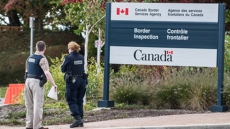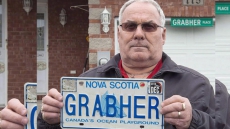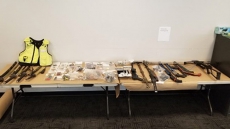VANCOUVER — The advocacy group for local governments in British Columbia wants the provincial government to fork over a 40 per cent share of its marijuana tax revenue when the drug becomes legal.
The Union of B.C. Municipalities has tabled a resolution asking the provincial government to provide local governments with $50 million of the projected provincial cannabis excise tax revenue of $125 million over the first two years of legalization.
Representatives from city councils across the province will vote on the special resolution next week during the union's annual convention.
Vancouver Coun. Kerry Jang, who co-chairs a joint provincial-local government committee on cannabis regulation, says municipalities will face new costs when non-medical marijuana becomes legal Oct. 17, including policing, administrative and staffing costs related to enforcement and zoning.
Although it's unknown exactly how much revenue will come in from pot legalization, Jang said local governments want some of the money upfront in order to avoid having to find other sources, like boosting property taxes.
"To be honest, nobody really knows what the revenues are going to be like. That's why we're saying look, this is for the first couple of years to get us going and then we can look at other models afterwards," said Jang.
The resolution proposes splitting any extra revenue above the province's projected amount evenly with local governments.
Excise tax revenue would be distributed to local governments on a per capita basis, with all municipal and regional districts receiving a minimum of $10,000, regardless of population.
Depending on how accurate the revenue projections turn out to be after two years, the resolution suggests either continuing with the same model or considering a boost in provincial sales tax on cannabis from seven per cent to a maximum of 10 per cent and committing a portion to local governments.
Jang said the model pitched by the union of municipalities is largely based on what Ontario has promised its local governments.
In December, the federal government agreed to give 75 per cent of its marijuana excise tax revenue to the provinces and territories for two years, capping its own portion at $100 million.
It's up to the provinces and territories to determine how much of its revenue to share with municipalities and regional governments.
Canadian Federation of Municipalities President Vicki-May Hamm said that the UBCM proposal is line with proposals in Ontario and Quebec, but the federation is concerned about a lack of clarity from some provinces on what revenue sharing will look like as legalization looms.
"We are concerned that a lot of municipalities are planning for legalization without a plan from their provincial counterpart for revenue sharing. Quebec and Ontario have detailed and committed plans for how money will flow to municipalities. But other provinces have not even committed money," Hamm said in a statement.
The Canadian Federation of Municipalities initially proposed that local governments get one third, saying in a letter to federal Finance Minister Bill Morneau that the estimated $206 million annually to municipalities would be consistent with the low-end of the federation's preliminary cost estimates.
Some provinces have already determined a different split.
In March, Ontario said it would give $40 million — or 40 per cent of its projected share of federal marijuana taxes — to help cover law enforcement and safety costs associated with pot legalization. The money would be provided to municipalities upfront, beginning before legalization takes effect.
On Friday, B.C. Finance Minister Carole James said the government is forecasting very little revenue from cannabis, particularly in the first year of legalization.
"There are a lot of upfront costs around the infrastructure that's going to be needed to be able to manage the licensing and structures in our communities, so we are continuing to have conversations with municipalities about what they see as their role and what the provincial government's role is," James said.
"Those discussions will continue."
In a statement, the B.C. Ministry of Finance said the provincial government will bear "the vast majority" of costs to legalize cannabis.
Even after taking into account the revenue split with the federal government, the province does not expect substantial revenue from cannabis legalization in the near future, the ministry said. Its goal is to keep duties on cannabis low to stem the black market.
"We are committed to working with local authorities to understand their upfront and longer-term costs, along with any cost savings. We look forward to meeting with the UBCM executive in the near future to begin this discussion," it said.



